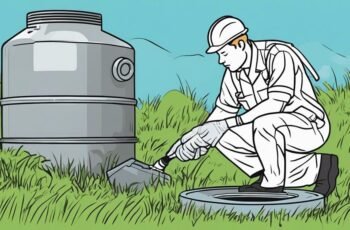Regular septic system maintenance is crucial to avoid unexpected expenses. Imagine coming home to find sewage backing up into your yard due to a neglected septic system. The inconvenience and potential health hazards could have been prevented with routine maintenance.
By staying proactive, you not only save money but also ensure the smooth operation of your system. Want to know more about how regular maintenance can benefit you in the long run?
Key Takeaways
- Prevent costly repairs by scheduling routine maintenance.
- Ensure proper system function with regular pumping and inspections.
- Protect environmental health by maintaining septic systems.
- Extend system lifespan and efficiency through consistent care.
Prevents Costly Repairs

Regularly maintaining your septic system prevents costly repairs down the line. By implementing preventative measures, you can avoid expensive fixes and ensure your system operates smoothly. Cost-effective solutions such as regular inspections, pumping every 3-5 years, and being mindful of what goes down your drains can significantly reduce the risk of major issues.
One of the most cost-effective preventative measures is scheduling routine inspections by a professional. These inspections can catch small problems before they escalate into more significant, more expensive repairs. Additionally, pumping your septic tank every few years helps prevent buildup that could lead to system failures. It's a simple step that can save you from costly repairs in the future.
Being cautious about what you flush down your drains is another crucial preventative measure. Avoiding flushing non-biodegradable items, grease, and chemicals can help maintain the health of your septic system, preventing clogs and damage. By taking these steps, you can save money in the long run and enjoy a trouble-free septic system.
Ensures Proper System Functionality
To ensure proper functionality of your septic system, regular maintenance practices are essential for preventing costly repairs and maintaining efficient operation. Neglecting maintenance can lead to system malfunctions, which may result in unpleasant backups and expensive fixes.
Here are three key reasons why regular maintenance is crucial for maximizing efficiency and avoiding backups:
- Pumping Schedule: Adhering to a regular pumping schedule based on your household size and water usage helps prevent solids from accumulating in the tank. When solids build up, they can clog the system, leading to backups and potential damage.
- Inspecting Components: Regularly inspecting the tank, drain field, and pipes can help catch small issues before they escalate. Identifying leaks, cracks, or blockages early on can prevent system failure and backups.
- Balanced Bacterial Environment: Maintaining a balanced bacterial environment within the septic tank is vital for breaking down waste efficiently. Using harsh chemicals or antibacterial products can disrupt this balance, hindering the decomposition process and potentially causing backups.
Protects Environmental Health

Ensuring proper maintenance of your septic system not only safeguards your property but also plays a critical role in protecting environmental health. Regular maintenance helps prevent water contamination and soil degradation, which are significant environmental concerns. When a septic system isn't well-maintained, it can leak harmful bacteria, viruses, and chemicals into the groundwater, potentially contaminating drinking water sources. This contamination poses serious health risks to you, your family, and the surrounding community.
Moreover, a neglected septic system can lead to soil degradation. When untreated wastewater saturates the soil due to system malfunctions, it disrupts the soil's natural processes and fertility. This can harm plant life and affect the ecosystem balance in your area. By staying proactive with septic system maintenance, you actively contribute to preserving the quality of groundwater and soil, ensuring that harmful pollutants don't seep into the environment. Remember, by protecting your septic system, you're also safeguarding the environmental health of your surroundings.
Extends System Lifespan
Taking proactive steps to maintain your septic system can significantly extend its lifespan and prevent costly repairs in the future. By following a regular maintenance schedule, you can ensure your septic system operates efficiently and remains odor-free.
Here are three key ways regular maintenance extends the lifespan of your septic system:
- Increases Efficiency: Regularly pumping your septic tank and inspecting it for any signs of damage or clogs can help keep your system running smoothly. When the tank is pumped and maintained properly, solids are less likely to build up and cause blockages in the system, leading to improved overall efficiency.
- Reduces Odors: Proper maintenance, such as routine inspections and addressing any issues promptly, can help prevent foul odors from emanating from your septic system. By keeping the system well-maintained, you can ensure that it operates odor-free, creating a more pleasant environment around your property.
- Prevents Costly Repairs: Regular maintenance not only extends the lifespan of your septic system but also helps prevent major issues that could result in expensive repairs. By investing in maintenance now, you can avoid larger costs down the road and prolong the life of your septic system.
Frequently Asked Questions
What Are Some Common Signs That Indicate My Septic System May Not Be Functioning Properly?
If you notice foul odors or a soggy yard, it could be signs of septic system trouble. Backups in drains and slow drainage are also red flags. Keep an eye on your drain field for any issues.
How Often Should I Have My Septic System Inspected and Pumped?
You should have your septic system inspected every 3-5 years and pumped every 3-5 years. While DIY maintenance like water conservation is good, professional services ensure thorough checks and proper upkeep, preventing costly issues.
Are There Any Specific Household Products or Practices That Can Harm My Septic System?
To avoid septic system dangers, you must be mindful of harmful household products and practices. Preventive measures include avoiding excessive use of antibacterial soaps, harsh chemicals, grease, and flushing items like wipes or feminine hygiene products.
Can Regular Maintenance Help Prevent Groundwater Contamination?
Regular maintenance is crucial for groundwater protection. By preventing septic system leaks and overflows, you actively contribute to pollution prevention. The environmental impact is significant, showing the benefits of regular upkeep.
Is It Necessary to Hire a Professional for Septic System Maintenance, or Can I Do It Myself?
You can handle DIY septic tasks like visual inspections and monitoring water usage. However, professional help for pumping, complex repairs, and inspections every 3-5 years ensures proper functioning, prevents issues, and maintains system longevity.
Conclusion
In conclusion, regular septic system maintenance is crucial for preserving the health and longevity of your system. By staying on top of maintenance tasks, you can prevent costly repairs, ensure proper functionality, protect the environment, and extend the lifespan of your septic system.
It's like giving your septic system a spa day to keep it running smoothly and efficiently. So, don't wait until it's too late – schedule your maintenance now and keep your system in top shape!

